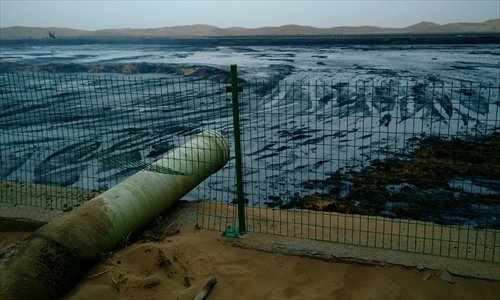HOME >> CHINA
NGOs await top court ruling that may allow them to sue more easily
By Jiang Jie Source:Global Times Published: 2015-12-20 19:43:01

View of a massive sewage lagoon filled with polluted water in the Tengger Desert in Alashan, North China's Inner Mongolia Autonomous Region on August 29, 2014. Photo: IC
The decision of the Supreme People's Court (SPC) on December 3 to deliberate an NGO's petition demanding the retrial of public interest litigation against polluters in Northwest China's Tengger Desert has raised hopes that this case can advance Chinese NGO's fight against pollution.Filed by Beijing-based China Biodiversity Conservation and Green Development Foundation (CBCGDF) in late November, the petition called for a retrial of the foundation's case against eight companies that are allegedly polluting the Tengger Desert, which is located in the Ningxia Hui Autonomous Region and the Inner Mongolia Autonomous Region.
Explain yourself
The CBCGDF filed the lawsuit against the eight companies in August at a local court in the Ningxia city of Zhongwei for allegedly discharging large amounts of toxic liquids into the Tengger Desert since 2007.
In September 2014, the owner of one of the accused factories was fined 5 million yuan ($771,500) and was ordered to shut down the factory, while the owner of another one of the factories received one-and-a-half years' imprisonment for illegal pollution, the Xinhua News Agency reported.
However, both the city court and regional intermediate court rejected the NGO's lawsuit on the grounds that the organization was not qualified to file the case, as environmental protection is not covered by the description of the organization's mission that the CBCGDF filed with the authorities when it was established.
The SPC can now designate an intermediate court for a retrial if it finds that the previous court judgment was wrong, or it can uphold the previous judgment, said Xia Jun, a lawyer with the Environment and Resources Law Committee of the All China Lawyers Association.
"It is clear that the CBCGDF has been dedicated to environmental protection. Judicial authorities should not look at the NGO's description written in its registration forms [at the civil affairs departments] only, but what they've been doing," Xia noted.
Xia said he also expects the SPC to issue an official explanation about how courts should handle these kinds of qualification issues if the case goes to a retrial in order to allow NGOs to more easily file future public interests litigation cases.
An CBCGDF employee said that the NGO expects fair treatment and a solution to the qualification issue, which has become a key problem facing many NGOs.
Zhao Liang, one of the founders of the Tianjin-based NGO Tianjin Binhai Environmental Advisory Service Center, told the Global Times that the SPC's decision will hold symbolic significance not only to future environmental lawsuits but also to the nation's rule of law.
Uncertain future
While the cost of litigation can be passed to the losing party, uncertainty around whether a case will be heard or not makes filing cases risky and potentially expensive for NGOs, and the Ningxia local court's rejection of the lawsuit has renewed campaigners' concerns.
In January, China adopted a revised version of its Environmental Protection Law. Widely regarded as the strictest such law to date, it grants environmental authorities more power to punish polluters and allows NGOs to file lawsuits against them.
According to the revised law, social organizations will be eligible to pursue lawsuits if they are registered with civil affairs departments at the prefecture level or above, have been active in environmental public interest activities for at least five years and have no illegal offenses on their record.
From 2000 to 2013, about 50 environmental public interest lawsuits were heard by courts in China, the majority of which were filed by government departments, according to a report by the State-sponsored All-China Environmental Federation.
But despite over 700 NGOs being eligible to launch public interest lawsuits, only 45 cases have been filed in 2015 and none have been filed after the CBCGDF lawsuit was rejected as many NGOs decided to wait for the outcome of their case, the CBCGDF employee said.
Analysts pointed out that it is difficult for environmental NGOs to fund investigations, evidence collection, and pollution reports, in addition to local authorities interfering in cases.
The CBCGDF employee claimed that investigations could cost 200,000 yuan while some NGOs may have an annual budget of less than 1 million yuan. "We also need to take into consideration our relations with local authorities and enterprises. Therefore many of us lack the will and capability to launch litigation," he said.
However, Zhao argued that many NGOs have assisted public interest litigation, though they may not stand in court as plaintiffs, which demonstrates the trend toward litigation among environmental NGOs.
Newspaper headline: Long road to court
Posted in: Environment